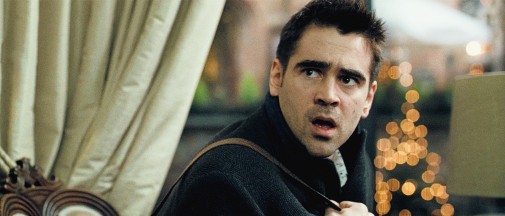
Colin Farrell is a fascinating actor. Early on in his career, he got good notices for his work in Joel Schumacher's Tigerland, but his following movies did little to build on that promise and make him a respected up and coming star. Instead, he became a mainstay of action movies of the early aughts, gaining popularity but not being much respected as an actor. On paper, 2004's Alexander looked like his big Oscar bid, but the Oliver Stone historical epic crashed and burned most spectacularly. Still, Farrell has always shown a keen eye when it comes to working with prestigious directors. He's collaborated with Stone, Terrence Malick, Woody Allen, Peter Weir, Liv Ullmann, Sofia Coppola, Steve McQueen, and Yorgos Lanthimos, among others. His work with Lanthimos has been particularly revelatory.
An actor so game to challenge himself and with such a résumé seems like someone who should have left a mark in the awards game. However, Farrell has very rarely been a contender for acting honors. Regarding the Oscars, he came closest in 2008…
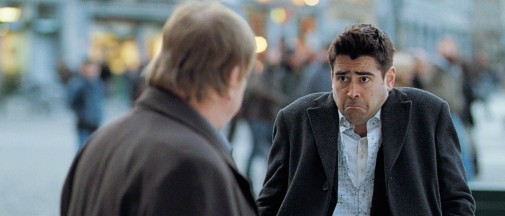
In Bruges is Martin McDonagh's first feature after establishing himself in the world of theater and conquering an Oscar for the short Six Shooter. Like many of his works, it explores themes of Catholic guilt, skewed morality, and extreme violence in the context of black comedy that gradually gives way to tragedy. Moreover, In Bruges' structure makes it more akin to a character study than a crime thriller, even though its explosions of bloodiness tend to cloud some of the more delicate psychological portraiture being done. Specifically, this is a portrait of two Irish hitmen from London who have found themselves displaced in the beautiful Belgian city of Bruges.
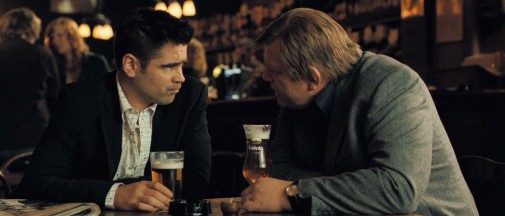
Ken, played by Brendan Gleeson, is an older gentleman who is perfectly content to await orders while playing tourist. Ray, Colin Farrell's character, on the other hand, is a miserable grump who detests everything about the city. He also seems to hold great contempt for most people who are unlike him, spitting profanities at anyone who crosses his path that tickles his bigotry. Only dwarves are protected from his foul tongue, but then his childish delight feels equally disrespectful, like the spectator of a freak show rather than a human being with adequate levels of empathy.
Through the first act of In Bruges, McDonagh explores the dynamic between these two men and their colorful surroundings, indulging in jokes that haven't aged all that well, and capitalizing on his actor's humorous talents. Farrell, in particular, feels at home in this register of pitch-black comedy, making great use of his hyperactive eyebrows and facial plasticity. His mugging could be bothersome in its broadness, but the floridly vile dialogue suggests a certain theatricality in which those actorly choices make sense. Furthermore, Farrell is magnetic when he's onscreen, managing to make the hideous character of Ray into a compelling anti-hero.

As the plot thickens and execution orders come from England, the film twists its comedy into something darker as the reasons for Ray and Ken's strange vacation become clear. As it happens, when performing a hit on a priest, the younger man accidentally killed an innocent child. Even within the webs of immorality in organized crime, such a deed is unforgivable and Ray must pay for the mistake with his life. What makes the scenario interesting isn't the jerk's desperation to survive but his willingness to stop living. You see, despite his callous appearance, Ray is a man drowning in guilt.
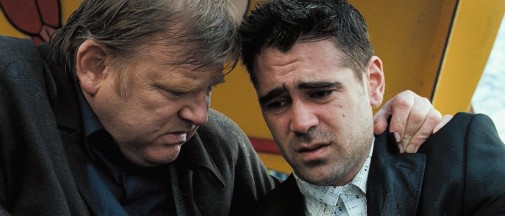
For all his comedic glory, it's when Farrell is tasked with portraying the hitman's internal conflict that he truly shines. In the aftermath of an interrupted suicide attempt, McDonagh lets both his actors tear themselves apart onscreen, Farrell crumbling while Gleeson tries to support him. The insouciant young man suddenly appears as a broken individual, his abrasiveness an exteriorization of the hatred he has for himself. He conveys a man being eaten alive from the inside out, guilt sucking his marrow and infecting his heart until there's nothing left but a numbness masked by a hollow smirk and a couple of witless insults. Only the affection he feels for his colleagues, mainly Ken, is capable of pulling him from the depths of belligerent depression.
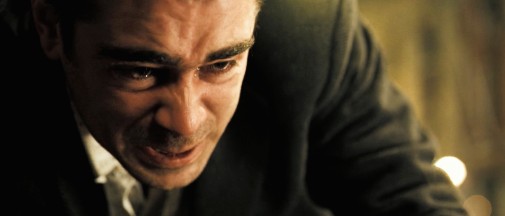
Colin Farrell won the Golden Globe for Best Actor in a Comedy or Musical and got himself some much deserved critical acclaim. Still, even with In Bruges getting a Screenplay nod, the actor had relatively little chance of getting in the Oscar lineup. Sean Penn for Milk, Mickey Rourke for The Wrestler, and Frank Langella for Frost/Nixon were locked going into nomination morning. As for Brad Pitt in The Curious Case of Benjamin Button, he benefitted from the Academy's overwhelming love for the picture. Richard Jenkins for The Visitor was in the most precarious position, having failed to secure a Globe nod, but the quality of his work and the support of the acting community secured him the nomination. Along with Farrell, Clint Eastwood in Gran Torino and Leonardo DiCaprio in Revolutionary Road were the likely contenders for the dreaded 6th spot back in the 2008 Best Actor race.
In Bruges is available to stream on HBO Now and HBO Go, Direct TV and the Cinemax Amazon Channel. You can also rent it from Amazon, Youtube and others.